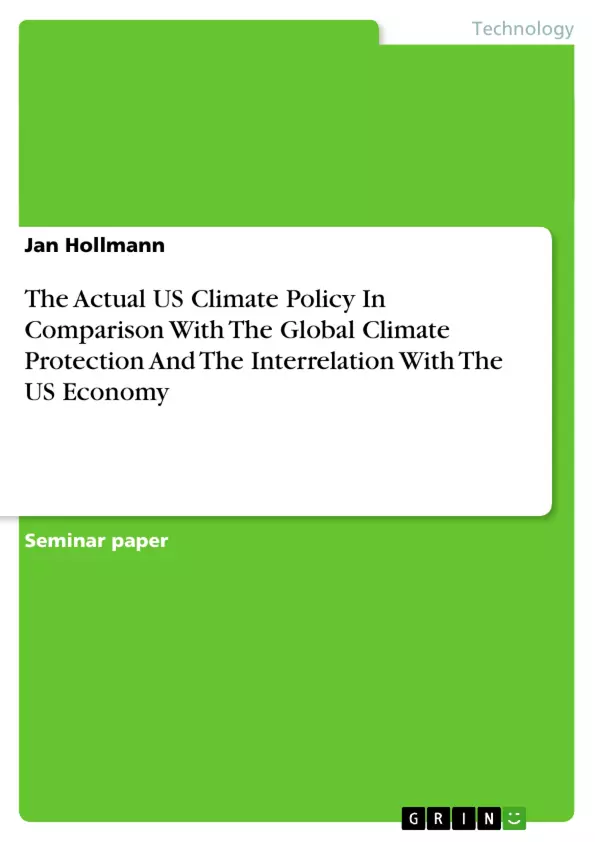Climate Change is a growing threat to the United States and all other nations. But what are the world's countries doing about it? Some details of this answer are listed in this project.
Global warming is a global problem that requires a global solution. Many American citizens begin to take action to fight climate change and its consequences because in the past environmental problems were not on the agenda in the US politics - except in California where climate problems were treated exemplary.
A growing number of state and local Governments and private companies in the USA are stepping forward to address climate change with reasonable, creative, cost-effective strategies to reduce greenhouse gas emissions. But is it enough to preserve our environment and our climate?
The US President called global warming "the greatest environmental challenge of the 21st century" and urge all Americans to help find solutions to this important problem.
Nevertheless the USA represented itself as “refusenik” for any agreements in climate policies during the last climate conferences (COPs).
Inhaltsverzeichnis (Table of Contents)
- Causes And Consequences Of Global Climate Change (Warming)
- The IPCC (InterGovernmental Panel on Climate Change) And "Climate Skeptics"
- The Kyoto Protocol
- The Actual US Climate Policy
- The US Attitude And Views
- The Refusal Of And The Alternative To The Kyoto Protocol
- The Enron Scandal
- Climate Policy Positions In Comparison: USA, EU And Developing Countries
Zielsetzung und Themenschwerpunkte (Objectives and Key Themes)
This project aims to analyze the actual US climate policy in comparison with the global climate protection efforts and to assess the interrelation between the US economy and its climate policy. The project will explore the causes and consequences of global climate change, examine the role of the IPCC and climate skeptics, and discuss the Kyoto Protocol and its implications for the US.
- The causes and consequences of global climate change
- The role of the IPCC and climate skeptics in understanding and addressing climate change
- The US climate policy in comparison with the global climate protection efforts
- The interrelation between the US economy and its climate policy
- The implications of the Kyoto Protocol for the US
Zusammenfassung der Kapitel (Chapter Summaries)
- Causes And Consequences Of Global Climate Change (Warming): This chapter explores the scientific evidence for global climate change, its potential consequences, and the role of human activities in driving these changes.
- The IPCC (InterGovernmental Panel on Climate Change) And "Climate Skeptics": This chapter discusses the work of the Intergovernmental Panel on Climate Change (IPCC) in assessing the scientific evidence for climate change. It also examines the arguments of climate skeptics who challenge the IPCC's findings.
- The Kyoto Protocol: This chapter focuses on the Kyoto Protocol, an international agreement that aims to reduce greenhouse gas emissions. It explores the key provisions of the Protocol, the challenges of implementing it, and the US's stance on the agreement.
- The Actual US Climate Policy: This chapter examines the US government's current climate policy, highlighting its key features, its strengths and weaknesses, and its overall effectiveness in addressing climate change.
- The US Attitude And Views: This chapter explores the different perspectives on climate change within the US, analyzing the arguments of those who support and oppose strong climate action.
- The Refusal Of And The Alternative To The Kyoto Protocol: This chapter examines the US government's decision to reject the Kyoto Protocol and discusses the alternative approaches it has proposed to address climate change.
- The Enron Scandal: This chapter explores the Enron scandal and its impact on public perceptions of corporate responsibility and environmental regulations in the US.
- Climate Policy Positions In Comparison: USA, EU And Developing Countries: This chapter compares the climate policies of the US, the European Union, and developing countries, highlighting their similarities and differences in terms of commitments, targets, and approaches to climate action.
Schlüsselwörter (Keywords)
The key words and focus topics of this project include climate change, global warming, greenhouse gas emissions, the Kyoto Protocol, US climate policy, environmental policy, energy consumption, economic development, and international cooperation.
- Arbeit zitieren
- Jan Hollmann (Autor:in), 2002, The Actual US Climate Policy In Comparison With The Global Climate Protection And The Interrelation With The US Economy, München, GRIN Verlag, https://www.hausarbeiten.de/document/8206


